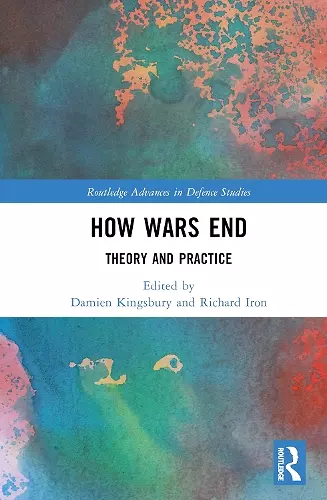How Wars End
Theory and Practice
Damien Kingsbury editor Richard Iron editor
Format:Hardback
Publisher:Taylor & Francis Ltd
Published:27th Dec '22
Should be back in stock very soon
This hardback is available in another edition too:
- Paperback£37.99(9781032329529)

This book addresses one of the most important issues in international relations – how wars are ended.
The volume draws on the direct experience of both soldiers and academics, who in each case have also been advisers on fighting and ending wars. Unlike more theoretical works, the book draws on first-hand experiences in the case studies, which include the wars in Iraq, Afghanistan, Sierra Leone and Indonesia, among others. The volume is constructed around a series of themes. The first theme is why wars start and how they can be understood, based on the assumption that knowing how, and why, wars start is fundamental to understanding how they might end. The second is what sustains wars and what makes them difficult to end. Again, once wars start, understanding what keeps them going is critical to how to end them. The third focuses on the role of external intervention in ending wars, including as a belligerent partner in war, as a peacemaking or peacekeeping force, and as a mediator between warring parties. The fourth addresses the issue of ‘ripeness’ and the right conditions for ending wars. The fifth addresses the modalities for ending wars and creating peace, with the sixth theme being focused on transitions to peace and what is required to help make those transitions successful.
The book will be of interest to students of military, strategic and security studies, peace studies and International Relations.
'This is an extremely timely and important book. The complexity of how wars end is not often studied; or if is studied, we tend towards the large and multifaceted industrial world wars of the 20th century. While this book covers lesser-known wars, it nevertheless highlights themes and questions that have been debated for millennia when considering human conflict. This book should be a must read for policy decision makers and military officers, as it offers important insights relevant to making the decision to go to war, the implementation of war, and how to attempt to end a war. Above all, it illuminates the need to recognize that war is not a simple and linear process, but a bloody and reciprocal one.'
Daniel Marston,Director of SECDEF Strategic Thinkers Programme, SAIS, Johns Hopkins University, USA
'This thoughtful collection of essays on war and peace is right to ponder how wars end. We seem to have forgotten how to end wars, on our terms, as demonstrated by our almost 2-decade long sojourn in the Middle East. When these long wars did finally end they only ended for us not the beleaguered people of Iraq and Afghanistan. We left and have chosen not to look back. To our shame there hasn’t been any real effort at the political or strategic level to learn any lessons from these most recent expenditures of blood and treasure. These essays and case studies invite us to think about which wars we choose in the future, why we choose them and our commitment to achieve victory. After our recent experience it is clear that someone forgot to ask some simple questions. Why go to war, what does victory look like and how do we know when we have won. Another important question is how we know when we have lost. As well as these questions we should examine the decisions to go to war, how they are made, who makes them and why. Another essential question is to examine is why we stay at war. Put simply, every day we remain at war is another decision to go to war. These essays from some of our most thoughtful writers on war and conflict are an essential read for politicians, policy makers, those engaged in strategic studies and anyone interested in the future security of Australia. While we ponder the important questions from our previous wars lets also think that we seem to be lining up candidates for future war and conflict. Hurry up and read this book before we make some more mistakes and blunders.'
Lieutenant General Peter Francis Leahy,AC, retired chief of the Australian Army (2002-08), Professor and foundation director of the National Security Institute, University of Canberra, Australia
ISBN: 9781032329512
Dimensions: unknown
Weight: 460g
296 pages